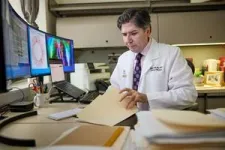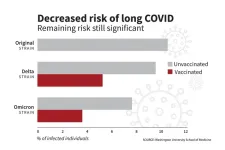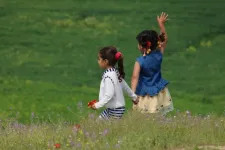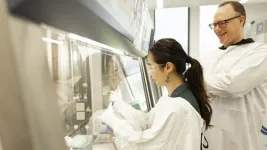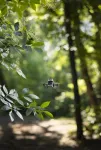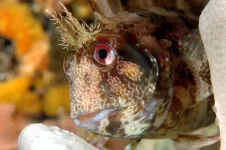(Press-News.org) The Science
Polyphenols are a diverse group of organic compounds produced by plants. These compounds are often toxic to microorganisms. In peatlands, scientists thought that microorganisms avoided this toxicity by degrading polyphenols using an enzyme that requires oxygen. However, when there is little or no oxygen, like after flooding due to climate induced thawing, the enzyme is inactive, and polyphenols accumulate. This inhibits microbes’ carbon cycling. In this study, scientists mined data for thousands of microbial genomes recovered from Stordalen Mire, an Arctic peatland in Sweden. They discovered that these microorganisms used alternative polyphenol-active enzymes, with and without oxygen. The study underscores the significance of polyphenols in peatland carbon dynamics. It also suggests that the carbon stored in these ecosystems is at greater risk to be released into the atmosphere by climate change than previously thought.
The Impact
Arctic peatlands store vast amounts of carbon. As global temperatures increase and environments change in response, the stability of the carbon stored in these habitats has emerged as a pressing concern. Researchers delved deep into the soil microbiome, scrutinizing the functions of thousands of microorganisms in an Arctic peatland ecosystem. Contrary to previous assumptions, the study revealed that many microorganisms metabolize polyphenols. Scientists had believed that this complex class of carbon compounds was inert and an important part of carbon storage. Armed with this new insight, scientists are better equipped to forecast the impacts of climate change on Arctic ecosystems and devise targeted strategies for mitigating these effects.
Summary
Peatlands have long intrigued scientists as reservoirs of terrestrial carbon, yet the role of microorganisms in carbon cycling has remained enigmatic. Contrary to past assumptions, this new research challenges the notion that peatland microorganisms exclusively degrade polyphenols under oxygenated conditions using phenol oxidase. Drawing from insights derived from other oxygen-limited environments like the human gut and rumen, where alternative enzymes and pathways metabolize polyphenols, the research team developed a novel computational tool to rapidly profile polyphenol metabolisms in microbial genomes. This software, applied to thousands of microbial genomes sampled from an Arctic peatland, unveiled a surprising diversity of polyphenol-transforming biochemical pathways. Remarkably, certain microorganisms encoded a profusion of these genes, signifying a polyphenol degradation prowess. Furthermore, the findings highlight the adaptability of microbial gene expression to shifts in soil redox conditions across the landscape.
By uncovering this hidden biochemistry, this research pioneers a new understanding of carbon cycling in these climate critical ecosystems. These insights not only expand knowledge of microbial metabolism but also underscore the intricate interplay between microorganisms and carbon dynamics in the face of climate change.
Funding
This material was based on work supported by the Department of Energy (DOE) Office of Science, Biological and Environmental Research Program, as well as the National Sciences Foundation Biological Integration Institute. A portion of this research was performed under the DOE Facilities Integrating Collaborations for User Science program and used resources at the Joint Genome Institute and the Environmental Molecular Sciences Laboratory, both DOE Office of Science user facilities.
END
Although tiny, peatland microorganisms have a big impact on climate
Leveraging a new genome annotation tool, researchers identified ‘talented’ microorganisms with genes for transforming polyphenols in peatlands
2024-07-17
ELSE PRESS RELEASES FROM THIS DATE:
Risk of long COVID declined over course of pandemic
2024-07-17
The risk of developing long COVID has decreased significantly over the course of the COVID-19 pandemic, according to an analysis of data led by Washington University School of Medicine in St. Louis.
Researchers attributed about 70% of the risk reduction to vaccination against COVID-19 and 30% to changes over time, including the SARS-CoV-2 virus’s evolving characteristics and improved detection and management of COVID-19.
The research is published July 17 in The New England Journal of Medicine.
“The research on declining rates ...
Learning from Venus: Combining earth system sciences with planetary sciences
2024-07-17
The University of Freiburg is establishing a new tenure track professorship in Earth and Planetary Geodynamics at the Faculty of Environment and Natural Resources, made possible by a 1.71 million euro grant from the Volkswagen Foundation. The new tenure track professorship is part of a comprehensive strategic initiative for combining Earth system sciences with planetary sciences at the University that also includes the establishment of a new Earth System Simulation Lab (EaSySim) and the introduction of an Earth Sciences ...
Texas A&M researchers receive $5 million to study brucellosis in Armenia
2024-07-17
A research team at the Texas A&M School of Veterinary Medicine and Biomedical Sciences (VMBS) has received a $5 million grant from the United States Department of Defense’s Defense Threat Reduction Agency to support the detection and prevention of brucellosis in Armenia.
Brucellosis, which is caused by several bacterial species of Brucella, is a zoonotic disease that can spread to humans from dogs and major livestock species, including cattle, pigs, sheep, and goats. It can have a major impact on a country’s public health and agricultural economy.
The team of Texas A&M researchers, led by VMBS Associate Professor Dr. Angela Arenas, will ...
How effective is MS medication across racial and ethnic groups?
2024-07-17
MINNEAPOLIS – For people with relapsing-remitting multiple sclerosis (MS), a new study has found that the drug ofatumumab is more effective than teriflunomide at helping people across racial and ethnic groups reach a period of no disease activity. The study is published in the July 17, 2024, online issue of Neurology®, the medical journal of the American Academy of Neurology. Ofatumumab, a monoclonal antibody, is a newer drug for treating MS. Teriflunomide, an immunomodulatory agent, has been available for over a decade.
MS is a disease in ...
Study: Uninsured, Hispanic people less likely to be referred to care after stroke
2024-07-17
MINNEAPOLIS – Insurance coverage, ethnicity and location may all play a role in a person’s ability to receive care after a stroke, according to a study published in the July 17, 2024, online issue of Neurology® Clinical Practice, an official journal of the American Academy of Neurology.
“Receiving the right care after a stroke is crucial to recovery and minimizing disability,” said study author Shumei Man, MD, PhD, of the Cleveland Clinic in Ohio and a member of the American Academy of Neurology. “Unfortunately, decisions about care may be influenced by factors such as race, insurance, and geographic location. Our study ...
Most Afghans support women’s rights, especially when men think of their daughters
2024-07-17
A majority of people in Afghanistan support human rights for Afghan women, and men are especially likely to support women’s rights when primed to think about their eldest daughters, according to a study published July 17, 2024, in the open-access journal PLOS ONE, by Kristina Becvar and colleagues from the University of Massachusetts at Amherst.
Human rights groups have been concerned for the rights of Afghan women in particular since the Taliban took control of Kabul in 2021. Since then, Afghan ...
New antidote for cobra bites discovered
2024-07-17
Scientists at the University of Sydney and Liverpool School of Tropical Medicine have made a remarkable discovery: a commonly used blood thinner, heparin, can be repurposed as an inexpensive antidote for cobra venom.
Cobras kill thousands of people a year worldwide and perhaps a hundred thousand more are seriously maimed by necrosis – the death of body tissue and cells – caused by the venom, which can lead to amputation.
Current antivenom treatment is expensive and does not effectively ...
Ant insights lead to robot navigation breakthrough
2024-07-17
Have you ever wondered how insects are able to go so far beyond their home and still find their way? The answer to this question is not only relevant to biology but also to making the AI for tiny, autonomous robots. TU Delft drone-researchers felt inspired by biological findings on how ants visually recognize their environment and combine it with counting their steps in order to get safely back home. They have used these insights to create an insect-inspired autonomous navigation strategy for tiny, lightweight robots. The strategy allows such robots to come back home after long trajectories, while requiring extremely little computation and memory (0.65 kiloByte per ...
Soft, stretchy ‘jelly batteries’ inspired by electric eels
2024-07-17
Researchers have developed soft, stretchable ‘jelly batteries’ that could be used for wearable devices or soft robotics, or even implanted in the brain to deliver drugs or treat conditions such as epilepsy.
The researchers, from the University of Cambridge, took their inspiration from electric eels, which stun their prey with modified muscle cells called electrocytes.
Like electrocytes, the jelly-like materials developed by the Cambridge researchers have a layered structure, like sticky Lego, that makes them capable of delivering an electric current.
The self-healing jelly batteries can stretch ...
The most endangered fish are the least studied
2024-07-17
The most threatened reef fishes are also the most overlooked by scientists and the general public. That is the startling finding of a team of scientists led by a CNRS researcher.1 In a study to be published in Science Advances on July 17, they measured the level of human interest in 2,408 species of marine reef fish and found that the attention of the scientific community is attracted by the commercial value more than the ecological value of the fishes. The public, on the other hand, is primarily influenced by the aesthetic characteristics of certain species, such as the red lionfish ...
LAST 30 PRESS RELEASES:
Scientists identify smooth regional trends in fruit fly survival strategies
Antipathy toward snakes? Your parents likely talked you into that at an early age
Sylvester Cancer Tip Sheet for Feb. 2026
Online exposure to medical misinformation concentrated among older adults
Telehealth improves access to genetic services for adult survivors of childhood cancers
Outdated mortality benchmarks risk missing early signs of famine and delay recognizing mass starvation
Newly discovered bacterium converts carbon dioxide into chemicals using electricity
Flipping and reversing mini-proteins could improve disease treatment
Scientists reveal major hidden source of atmospheric nitrogen pollution in fragile lake basin
Biochar emerges as a powerful tool for soil carbon neutrality and climate mitigation
Tiny cell messengers show big promise for safer protein and gene delivery
AMS releases statement regarding the decision to rescind EPA’s 2009 Endangerment Finding
Parents’ alcohol and drug use influences their children’s consumption, research shows
Modular assembly of chiral nitrogen-bridged rings achieved by palladium-catalyzed diastereoselective and enantioselective cascade cyclization reactions
Promoting civic engagement
AMS Science Preview: Hurricane slowdown, school snow days
Deforestation in the Amazon raises the surface temperature by 3 °C during the dry season
Model more accurately maps the impact of frost on corn crops
How did humans develop sharp vision? Lab-grown retinas show likely answer
Sour grapes? Taste, experience of sour foods depends on individual consumer
At AAAS, professor Krystal Tsosie argues the future of science must be Indigenous-led
From the lab to the living room: Decoding Parkinson’s patients movements in the real world
Research advances in porous materials, as highlighted in the 2025 Nobel Prize in Chemistry
Sally C. Morton, executive vice president of ASU Knowledge Enterprise, presents a bold and practical framework for moving research from discovery to real-world impact
Biochemical parameters in patients with diabetic nephropathy versus individuals with diabetes alone, non-diabetic nephropathy, and healthy controls
Muscular strength and mortality in women ages 63 to 99
Adolescent and young adult requests for medication abortion through online telemedicine
Researchers want a better whiff of plant-based proteins
Pioneering a new generation of lithium battery cathode materials
A Pitt-Johnstown professor found syntax in the warbling duets of wild parrots
[Press-News.org] Although tiny, peatland microorganisms have a big impact on climateLeveraging a new genome annotation tool, researchers identified ‘talented’ microorganisms with genes for transforming polyphenols in peatlands

